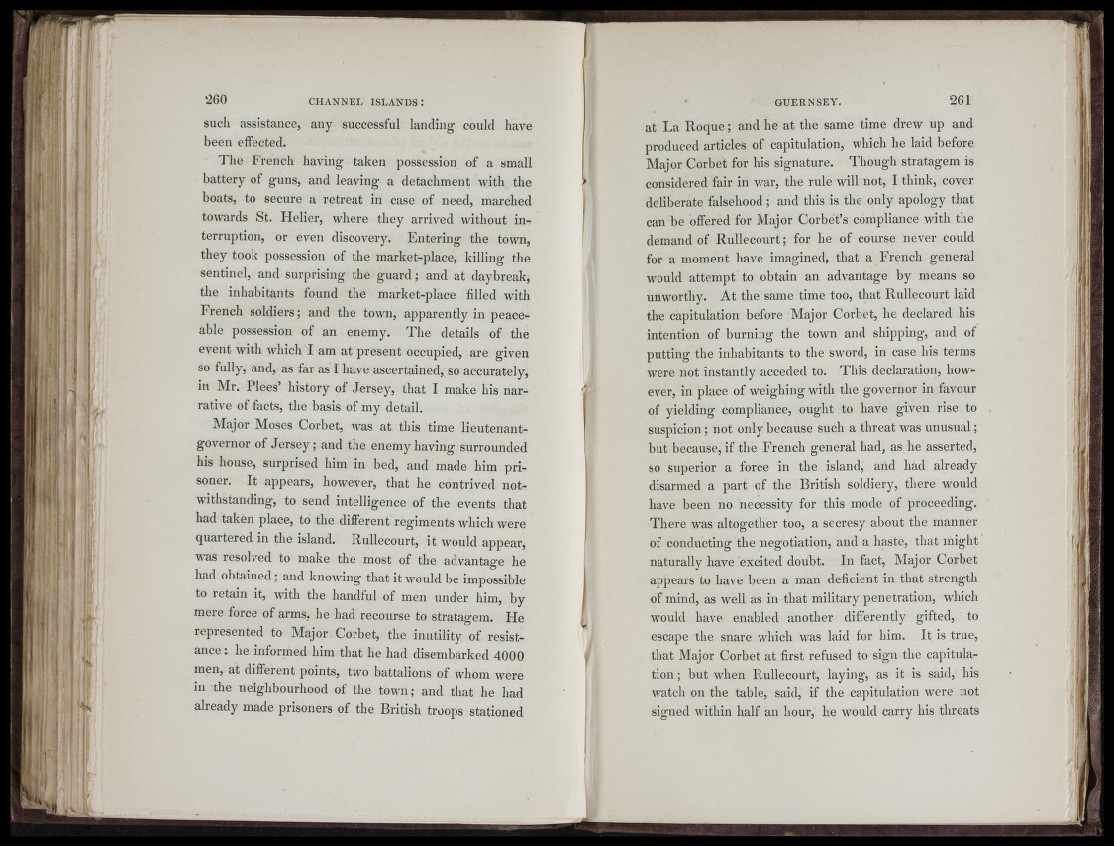
vii
I;M
f
1 : » Ji -.'I'.
i1 i0E I!” tE|M'
- » ' Eh .1 ' j '
i | H ' : I
i ••-Ei :
M "M l
: I ' Ia : i 1Ì
such assistance, any successful landing could have
been effected.
The French having taken possession of a small
battery of guns, and leaving a detachment with the
boats, to secure a retreat in case of need, marched
towards St. Helier, where they arrived without interruption,
or even discovery. Entering the town,
they took possession of the market-place, killing the
sentinel, and surprising the guard ; and at daybreak,
the inhabitants found the market-place filled with
French soldiers; and the town, apparently in peaceable
possession of an enemy. The details of the
event with which I am at present occupied, are given
so fully, and, as far as I have ascertained, so accurately,
in Mr. Plees’ history of Jersey, that I make his narrative
of facts, the basis of my detail.
Major Moses Corbet, was at this time lieutenant-
governor of Jersey; and the enemy having surrounded
his house, surprised him in bed, and made him prisoner.
It appears, however, that he contrived notwithstanding,
to send intelligence of the events that
had taken place, to the different regiments which were
quartered in the island. Rullecourt, it would appear,
was resolved to make the most of the advantage he
had obtained ; and knowing that it would be impossible
to retain it, with the handful of men under him, by
mere force of arms, he had recourse to stratagem. He
represented to Major Corbet, the inutility of resistance
: he informed him that he had disembarked 4000
men, at different points, tw’o battalions of whom were
in the neighbourhood of the town ; and that he had
already made prisoners of the British troops stationed
tV
at La Roque ; and he at the same time drew up and
produced articles of capitulation, which he laid before
Major Corbet for his signature. Though stratagem is
considered fair in war, the rule will not, I think, cover
deliberate falsehood ; and this is the only apology that
can be offered for Major Corbet’s compliance with the
demand of Rullecourt; for he of course never could
for a moment have imagined, that a French general
would attempt to obtain an advantage by means so
unworthy. At the same time too, that Rullecourt laid
the capitulation before Major Corbet, he declared his
intention of burning the town and shipping, and of
putting the inhabitants to the sword, in case his terms
were not instantly acceded to. This declaration, however,
in place of weighing with the governor in favour
of yielding compliance, ought to have given rise to
suspicion ; not only because such a threat was unusual ;
but because, if the French general had, as he asserted,
so superior a force in the island, and had already
disarmed a part of the British soldiery, there would
have been no necessity for this mode of proceeding.
There was altogether too, a secresy about the manner
of conducting the negotiation, and a haste, that might
naturally have excited doubt. In fact. Major Corbet
appears to have been a man deficient in that strength
of mind, as well as in that military penetration, which
would have enabled another differently gifted, to
escape the snare which was laid for him. It is true,
that Major Corbet at first refused to sign the capitulation
; but when Rullecourt, laying, as it is said, his
watch on the table, said, if the capitulation were not
signed within half an hour, he would carry his threats
I
Es
II
i